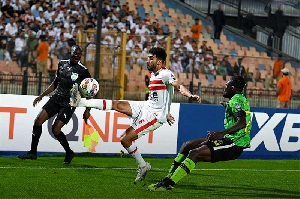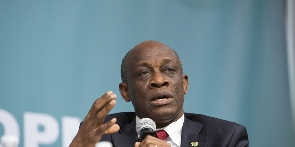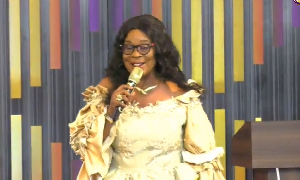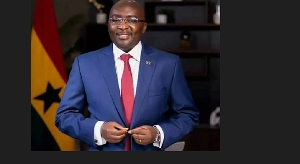- Home - News
- TWI News | TV
- Polls
- Year In Review
- News Archive
- Crime & Punishment
- Politics
- Regional
- Editorial
- Health
- Ghanaians Abroad
- Tabloid
- Africa
- Religion
- Election 2020
- Coronavirus
- News Videos | TV
- Photo Archives
- News Headlines
- Press Release
General News of Sunday, 13 August 2006
Source: Asare Otchere-Darko, reporting from New York
More Of Our Troops For Lebanon
- After Un Security Council Increases UNIFIL To 15,000
The United Nations Security Council's resolution Friday to increase UN Interim Force in Lebanon troops from 2,000 to 15,000 with enhanced authority has been hailed by the current President of the Council and Ghana’s Foreign Minister Nana Addo Dankwa Akufo-Addo as “an important step towards the search for a comprehensive solution in the Middle East problem, the core of which is the Palestinian Question.”
“In this regard,” he added, “the President of the Republic of Ghana, H E John Agyekum Kufuor, and the Ghanaian government intend to work closely with the other members of the Council in implementing the two-state solution, which entails an independent Palestinian State living side-by-side with Israel within internationally-recognised borders.”
Foreign Minister Nana Akufo-Addo, who chaired Friday’s crucial meeting, said further to a very anxious world audience, he believed the resolution strengthened the hand of the international community and was “a clear signal to those involved in the hostilities that the world is united, on the way forward, and out of this crisis.”
The UN vote, won under Ghana’s presidency of the Security Council, capped almost a month of diplomatic dithering on the part of the Council to find a solution to the month-long blood shed.
In his address to the Security Council, a relieved Kofi Annan said the failure of the 15-member body to act sooner had “badly shaken the world's faith in its authority and integrity.”
Ghana took over the presidency of the Security Council on August 1.
The resolution, which was co-sponsored by Ghana, endorsed an extra deployment of 15,000 Lebanese troops as well as calling for a “cessation of hostilities” in the war between Israel and Lebanon's Hezbollah militia. Meanwhile, at the weekend, one member of the Ghanaian battalion with UNIFIL was wounded early when two artillery rounds from the Israeli side impacted directly inside a UNIFIL position in the area of Haris in the central sector, the Force reported.
Poignantly aware at the time that the recent conflict has killed some 1,000 Lebanese and 123 Israelis and displaced more than 1 million people, Nana Akufo-Addo, the first Ghanaian Foreign Minister to preside over the all-powerful Security Council stressed, “The international community, especially this Council, should leave no stone unturned in tackling this problem and seeing to its successful realisation.”
The UN resolution, which was read by Nana Akufo-Addo to an anxious world in the late hours of Friday at the UN headquarters here in New York, empowers UNIFIL to take necessary action “to ensure that its area of operations is not utilised for hostile activities of any kind” and “to resist attempts by forceful means to prevent it from discharging its duties.” It gives UNIFIL, which has been roundly criticised for its hitherto toothlessness, greater authority, equipment, responsibilities and scope of operation. Nana Akufo-Addo told this paper that rather than putting our troops in the line of fire, this “new robust authority” grants them greater security and effectiveness in carrying out their all-important peace mandate.
The conflict that has engulfed Lebanon and northern Israel over the past month is set to end on Monday, UN Secretary-General Kofi Annan announced late Saturday following talks with the leaders of both countries.
“As I promised the Security Council yesterday, I have today been in touch with the Prime Ministers of Israel and Lebanon to discuss with them the exact date and time when the cessation of hostilities called for by the Council will enter into force,” Mr. Annan said in a statement, announcing that the two leaders have agreed that “the cessation of hostilities and the end of the fighting will enter into force on 14 August, at 0500 hours GMT.”
The Secretary-General voiced his preference for an immediate halt to the hostilities “to respect the spirit and intent of the Council decision, the object of which was to save civilian lives, to spare the pain and suffering that the civilians on both sides are living through.”
Urging the parties to stop immediately, he assured them that the UNIFIL will work with them to implement the agreement and will monitor compliance. The resolution which enjoyed unanimous support from the Council also extends UNIFIL’s mandate by a year and urges countries to contribute troops to the significantly beefed-up UNIFIL.
France, a key architect in drafting the resolution, is expected to lead the contingent and its foreign minister, Philippe Douste-Blazy, told the Security Council Paris would “examine with its European partners the possibility of providing additional support.” The other key architect, the United States, is not expected to contribute any troops.
Speaking exclusively to The Statesman after the crucial vote, Nana Akufo-Addo said the matter was already before President John Agyekum Kufuor and the National Security Council and that Ghana can be expected to fully contribute her quota to the additional 13,000 troops.
“Helping maintain peace in the Middle East with the direct participation of our troops has always been an important part of our international policy,” the Foreign Minister told The Statesman, recalling that both Major Erskine and General Obeng have commanded UNIFIL in the past. Besides Ghana and France, Australia, Turkey and Italy are also expected to contribute troops.
Nana Akufo-Addo, who was the last person to address the Council after the vote, stated at the occasion, nobody can surpass the force of the “moral authority and sheer diplomatic clout” of the Council “when it acts in unity, and remains faithful to its responsibilities.”
Displaying his superb international statesmanship in the full glare of international cameras and top international diplomats of the Security Council, Ghana’s highly respected Foreign Minister stated authoritatively: “We expect nothing less when we come to grapple with the fundamental question of a comprehensive, just and lasting solution to the long-standing Middle East Question.
“Clearly, the solution is within the grasp of the Security Council and we must resolve to work together in a spirit of compromise, to bring to a speedy end the pain and suffering of the people of this troubled region,” he announced to loud agreeable nods from his US counterpart, Condoleeza Rice.
Ghana’s Foreign Minister later on described Friday’s Security Council meeting to The Statesman as a success, in the context of the Middle East. “The fact that there was such a remarkable consensus from all sides and the resolution enjoyed the overwhelming support of the Council,” means there is an opportunity to finding an “enduring peace settlement.”
By Saturday, Hezbollah leader Hassan Nasrallah was promising an end to rocket fire on northern Israel as soon as Israeli forces cease operations in southern Lebanon.
Speaking from his hotel room in Chicago, where he chaired the inauguration of a foundation set up to combat kidney disease in Ghana, Nana Akufo-Addo described Sheik Nasrallah’s response to the resolution as “a tentative step toward peace.”
The Lebanese government, which met Saturday, had already indicated it will accept the Security Council's demands.
Israel has also indicated it will abide by the resolution during its cabinet meeting scheduled for yesterday, with officials announcing at the weekend that Israel would halt offensive operations on Monday.
Ironically, the resolution was adopted as the Israeli army pushed deeper into Lebanon, pushing columns of ground forces, supported by armour, into southern Lebanon beyond the Litani River. Israel tripled the size of its combat forces inside Lebanon between Friday and Sunday, in a last minute dash to push Hezbollah and their rockets back from the reach of Israeli targets. The resolution itself now extends the so-called blue line zone for the new joint force of 30,000 from the Lebanese-Israeli border to the Litani River, about 15 miles to the north of Lebanon.
By Saturday, hundreds of Israeli infantry troops were streaming into Lebanon, according to reports, where they were engaged in intense fighting 7 miles north of the border; whiles swarms of rockets slammed into northern Israel, with residents of the coastal city of Haifa running for cover. Thousands of rockets have hit Israel over the last few weeks, making it the heaviest bombardment in the Jewish state’s 58 years of existence.
The measure, negotiated by the United States and France, envisions a phased withdrawal of Israeli troops from southern Lebanon when violence subsides.
The resolution that the Council finally passed represented a compromise between the US and France, with Israel and Lebanon standing behind them. Negotiations on a plan to halt the war, triggered on July 12 when Hizbollah guerrillas captured two Israeli soldiers in a cross-border raid.
At the insistence of Lebanon, the text deletes mention of Chapter VI of the UN Charter but, the President of the Council, Nana Akufo-Addo admits it uses language from that provision that allows robust enforcement. As one US diplomat put it, “It talks like, walks like, and acts like Chapter VII,” even though it literally fell under the less coercive Chapter V.
The document imposes an arms embargo on Lebanon on the delivery of weapons or military equipment to “any entity or individual,” with the exception of the Lebanese army and UN troops.
But it leaves any disarmament of Hizbollah, as the Security Council had demanded, to a future political settlement.
Many of the foreign ministers in attendance agreed with US Secretary of State Condoleezza Rice when she told Council members before the vote that “our most pressing challenge now is to help the thousands of displaced people within Lebanon to return to their homes and rebuild their lives.” She announced an immediate increase of US$50 million in US humanitarian assistance to the Lebanese government.
The resolution calls for a “full cessation” of “all attacks” by Hezbollah, but only of “all offensive military operations” by Israel. When Nana Akufo-Addo was asked by this paper why the resolution did not define what it meant by “all offensive military operations”, his response was that, “the word offensive was self-explanatory.” The resolution calls upon Israel to withdraw all of its forces from southern Lebanon gradually in parallel with the 30,000 deployment of Lebanese and UNIFIL troops.
“Though it will bear the same name, this will not be the same force. It will be an enhanced UNIFIL,” said Dr Rice.
French Foreign Minister Philippe Douste-Blazy said that the UNIFIL mandate was “not to impose peace.”
He added, “UNIFIL will assist the Lebanese government…deploying its army in the south, providing humanitarian aid to populations, [and] helping the displaced return home.”
During the Council meeting, Nana Akufo-Addo, who sat next to his Ghanaian compatriot, UN Secretary General Kofi Annan could be overhead speaking to each other in twi, their shared local language.
Our troops and others who form UNIFIL have been tasked to monitor the cessation of hostilities, help to ensure humanitarian access to civilians and the safe return of displaced persons. They will also support the Lebanese armed forces as they deploy in the south and enforce their responsibilities under the resolution.
Apart from the firing incident which injured a Ghanaian soldier, there were four other incidents of firing from the Israeli side close to UN positions in the areas causing material damage but no casualties, according to UNIFIL, which reported that Hezbollah also fired rockets from the vicinity of UN positions. UNIFIL has reportedly strongly protested all the incidents to the Israeli and Lebanese authorities respectively.










